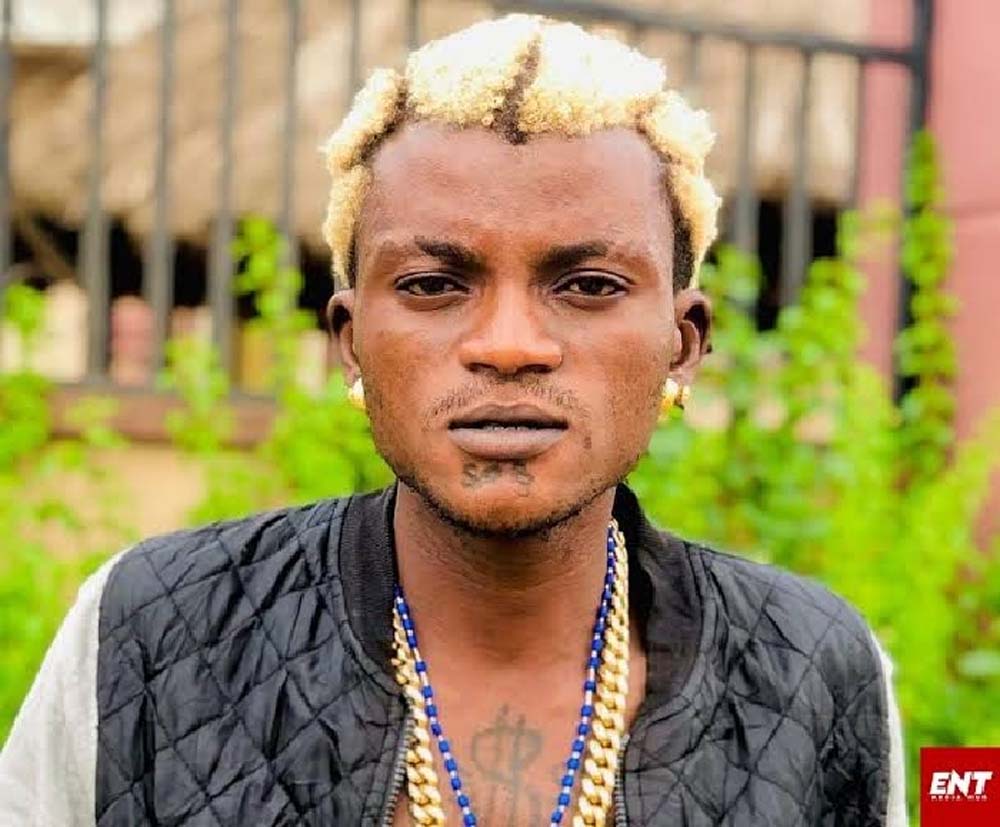Entertainment
MURIC Condemns Portable’s Song, Calls For Ban
The Muslim Rights Concern (MURIC) has issued a statement condemning a new song by singer Portable “Kuku do ritual” that glorifies ritual killings and calls for it to be investigated and banned.
The group has notified the police, traditional rulers, National Broadcasting Commission, and other national agencies about the song, describing it as “disgusting, detestable, and egregious” and an assault on Nigerian and African values.
MURIC also called on the Performing Musicians’ Association of Nigeria, the National Film and Video Censors Board, and the Nigerian Copyright Commission to take action and for the artist to be held accountable.
The MURIC statement partly reads: “Popular pop singer, Habeeb Okikiola, has released a new album under the title ‘Kuku Do Ritual’ in which part of the lyrics say, ‘Kuku do ritual. If you do ritual you go die. If you no do ritual you go die. Kuku do ritual’.
‘We find this song disgusting, detestable and egregious. It is a brazen assault on Nigerian and African values. Portable’s latest song has reduced human life to the level of ordinary ants that can be stamped out under human feet without qualms and without consequences. It is an open invitation to criminality. It makes mockery of law and order. It is an open disrespect for human life.
“This song has the capacity to influence our young ones in a negative manner. It is also capable of destroying the future of the youth. Something must be done urgently. Already, there are several reports of young ones engaging in the shameful act for the purpose of getting rich in their tender ages.
They also urged traditional rulers, mothers, and religious leaders to speak out against the song and its promotion of criminal behavior.
Entertainment
Portable Remanded In Kwara Prison For Failing To Meet Bail Terms

Controversial street-hop singer, Okikiola Badmus, better known by his stage name Portable, has been remanded at the Oke Kura Correctional Centre in Ilorin, Kwara State, after failing to meet the bail terms set by an Upper Area Court.
The singer was arraigned on Monday following allegations of defamation filed against him by veteran Fuji star, Akorede Saheed, popularly known as Saheed Osupa.
Although the court approved bail for Portable in the sum of N1 million, the conditions attached proved difficult for the singer to meet immediately.
READ ALSO: JUST IN: Court Grants Singer Portable ₦1m Bail Over Criminal Charges
The court stipulated that he must produce two sureties in like sum — one of whom must be “either the Chairman or Secretary of the Performing Musicians Association of Nigeria,” while the second must be “a property owner within a Government Reserved Area in Ilorin, supported by a valid Certificate of Occupancy.”
More to follow……….
Entertainment
‘Nigeria Jaga Jaga’ Will Remain Unofficial National Anthem Until Change Happens – Eedris Abdulkareem
Renowned Nigerian rapper and activist Eedris Abdulkareem has boldly asserted that his 2001 protest anthem Nigeria Jaga Jaga will continue to serve as Nigeria’s unofficial second national anthem, insisting it will remain so until the country addresses the systemic issues it critiques.
Abdulkareem, famed for his fearless criticism of corruption and social injustices, made these remarks in a recent interview with Channels TV.
The song, which has seen a resurgence in popularity on platforms like TikTok, was groundbreaking for its uncompromising portrayal of Nigeria’s governmental failures, rampant corruption, and decaying infrastructure.
READ MORE: Rapper Eedris Abdulkareem Drops New Single ‘THANK YOU‘
Abdulkareem declared, “Nigeria Jaga Jaga will continue to be the second national anthem, whether anybody likes it or not. But I always pray to wake up one day and find the song is no longer relevant. That would make me very happy.”
Released nearly a quarter of a century ago, Nigeria Jaga Jaga caused a national stir with its sharp criticism of the nation’s political and economic decay.
Even though the song faced government bans and significant backlash at the time, it has stood the test of time, resonating with generations of Nigerians who continue to grapple with the same issues.
Abdulkareem expressed regret that the song’s message remains as relevant today as it was when it was first released: “Until we see real development—constant electricity, security, and good leadership—Nigeria Jaga Jaga will remain relevant. Sadly, 24 years later, the message of the song is still our reality.”
Aside from revisiting his iconic hit, Abdulkareem also addressed the controversy surrounding his latest track, Tell Your Papa. The song, which was recently banned by the Nigerian Broadcasting Commission (NBC) and marked “Not to be Broadcast” (NTB), has ignited a fresh debate on the state of censorship and freedom of expression in Nigerian music.
Many believe that Tell Your Papa is a direct rebuttal to a viral video in which Seyi Tinubu, the son of President Bola Ahmed Tinubu, passionately defended his father’s administration.
Abdulkareem explained his motivation behind the song, revealing, “I was inspired by Seyi Tinubu. In the video, he kept repeating, ‘My father is the greatest president.’ But I differ. He may be the best father to Seyi, but he’s the worst president to Nigerians.”
The rapper went on to criticize the current administration for its failure to address Nigeria’s economic challenges, insecurity, and widespread youth unemployment.
Abdulkareem contrasted the privileged life of Seyi Tinubu with the struggles faced by everyday Nigerians, saying, “I told him to travel by road without security and feel the pain of the people.
Nigerian youths are asking for basic things—electricity, security, job opportunities—not palliatives.”
Despite the ban, Abdulkareem maintained that his song was not an insult but a truthful commentary on the country’s leadership.
“If you listen carefully, there’s nowhere in the song that I insult him. I just stated the truth. He spoke publicly, so I responded publicly. If he had remained silent, I wouldn’t have recorded the song,” Abdulkareem clarified.
Drawing comparisons to the legendary Afrobeat musician Fela Kuti, Abdulkareem emphasized that his criticism comes from a deep love for Nigeria.
“I’m a passionate Nigerian. I love this country deeply. But truth is bitter, and those in power don’t like hearing it,” he said. “I want a better Nigeria, and I’ll keep speaking out until we see real change.”
Entertainment
JUST IN: Court Grants Singer Portable ₦1m Bail Over Criminal Charges
An Upper Area Court sitting in Ilorin, Kwara State, has granted bail to controversial Nigerian singer, Okikiola Badmus, popularly known as Portable, in the sum of ₦1 million.
Portable was arraigned before the court on Sunday on charges bordering on criminal defamation, intimidation, inciting public disturbance, and cyberstalking.
Ruling on his bail application, the court ordered that the singer must produce two sureties in like sum.
READ ALSO: I Want To Fight Anthony Joshua – Portable
One of the sureties is required to be either the Chairman or Secretary of the Performing Musicians Association of Nigeria (PMAN), while the other must own a landed property within a Government Reserved Area (GRA) and present a valid Certificate of Occupancy as proof.
The court has adjourned the case, with further proceedings expected to continue in the coming days.
Details later…
















